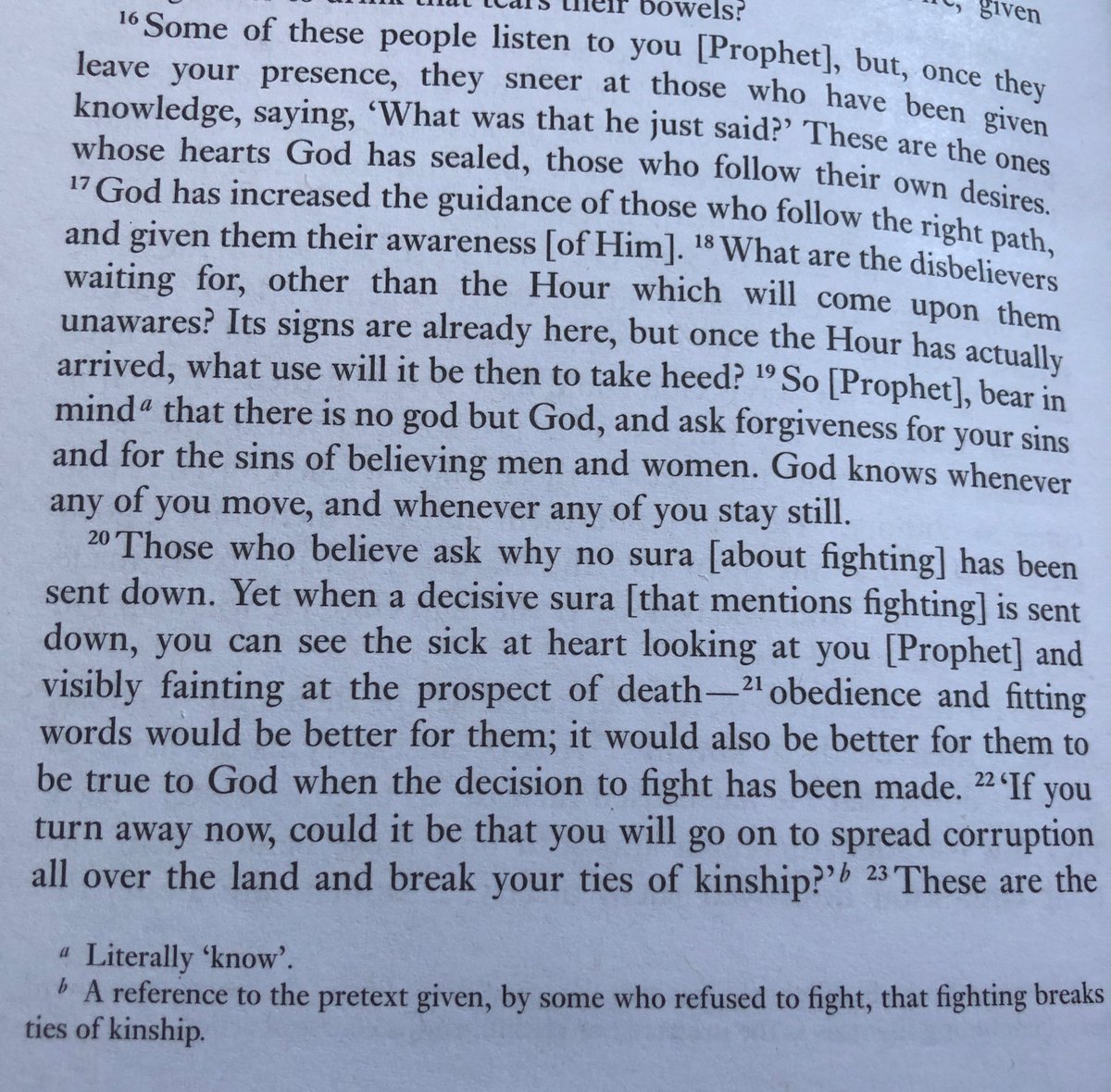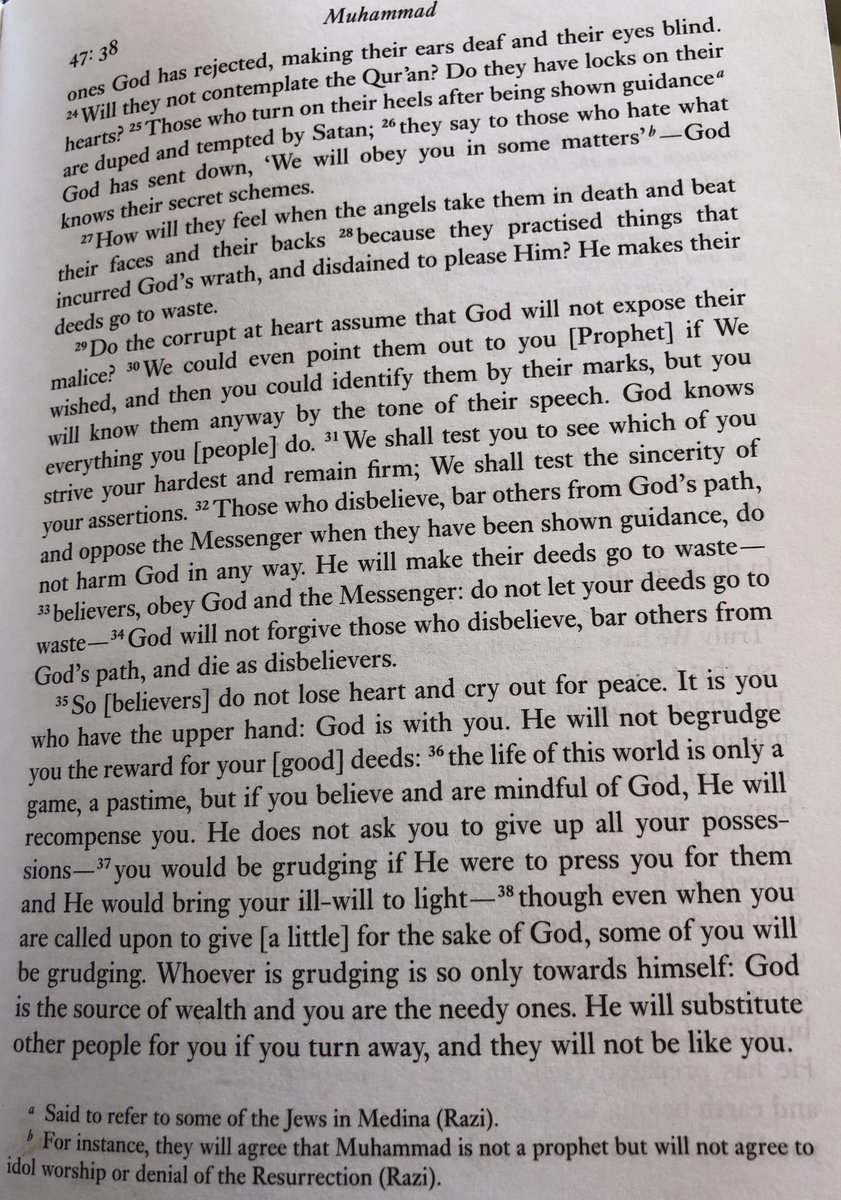I was tagged by @marymood for the Quran challenge, which I think involves sharing one verse, I’m going to do something different and share a passage from a Sura, and offer some thoughts on what I appreciate about it. may seem an unusual choice, but I am going w/ S. Muhammad (47) https://twitter.com/marymood/status/1252551644136513538">https://twitter.com/marymood/...
First off, it has a lyrical style which I absolutely love. Purely from an aesthetic perspective, I enjoy listening to this surah, enjoy reading it. The entire Qur’an is a work of other-worldly poetry, but this surah showcases to me the beauty of Qur’an Arabic.
The rhetorical style employed here is so direct, there is a real pedagogical artistry at play here. It is almost as if God in these verses is revealing to us our innermost thoughts, thoughts we daren’t think for ourselves, &reflecting to us the realities of what our claim..
..to have faith asks of us. The passage I want to focus on are verses 16-38. The translation I attach is from Abdel Haleem, but do look up and read the original Arabic, or simply listen to it.
Of course we should acknowledge and recognise that this surah was revealed in a particular situation and time – when the first Muslims were facing persecution, having fled Makkah for Medina and were being instructed for the first time to fight against their persecutors.
But in the current climate, too often, Muslims & students of the Qur’an in general find themselves pushing aside passages addressing fighting and war for fear of delving into ‘dodgy’ territory, or in a bid to explicitly demonstrate that they are & #39;pro-peace& #39;.
I think we severely short-change ourselves and our approach to the scripture by doing this, to our own detriment and the impoverishment of our understanding of the scripture and tradition as a whole. To me, these verses are about having the courage of our convictions:
There is acknowledgement of the difficult situation that believers find themselves in. Of the mockery and brazen hypocrisy displayed by disbelievers, and of the hesitation that is felt among believers regarding the command to fight.
There is a recognition of the validity of the very human fear of death, or by extension, of losing ground and losing relationships. Nonetheless, this passage is uncompromising in its expectations of us. It is a call for decisiveness in moments of persecution and oppression.
Fence-sitting& centrism are easier options for sure,& can be tempting as a form of ‘peacemaking’. This is alluded to in the sura as those reluctant to take a stand justifying themselves on the basis that they do not wish to cut ties or distance themselves from family members.
But this passage exposes the short-termism of such centrism, ultimately its futility as an abdication of responsibility. It is a call to believers to appreciate the weight of the responsibility that comes w their commitment to belief,& 2follow this commitment through to the end,
...by obedience to God, but also by enacting the principles demanded of their faith, standing up for justice and against oppression.
Even as this uncompromising call is made, the passage offers reassurance from God that sacrifices and righteousness are meticulously accounted for and rewarded, by Him who is the source of all goodness.
Now the fun bit, I tag: @JKGani @thebrownhijabi @Selina_Bakkar @tafsirdoctor @mesbushra - don’t be put off by my rambling thread which clearly broke all rules  https://abs.twimg.com/emoji/v2/... draggable="false" alt="🙈" title="See-no-evil monkey" aria-label="Emoji: See-no-evil monkey">
https://abs.twimg.com/emoji/v2/... draggable="false" alt="🙈" title="See-no-evil monkey" aria-label="Emoji: See-no-evil monkey">

 Read on Twitter
Read on Twitter



